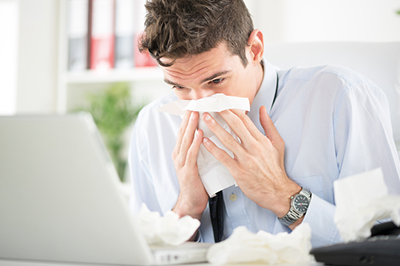How to prevent a cold or the flu from taking hold

Knowing how to prevent a cold may stop you from getting sick and help protect those around you. Thankfully, there are plenty of tips and tricks you can use to reduce the likelihood of catching a cold.
Learn more about colds and the flu and the causes of colds and flu.
How to prevent colds or the flu – 10 essential tips
1. Wash your hands
Hand-washing is one of the best ways to stop the spread of viruses. The Centers for Disease Control and Prevention says that washing hands properly could help reduce respiratory illnesses by up to 21%.
Knowing how the flu is spread can help lower your risk of contracting it. The viruses that cause colds and flu can live on hard surfaces for hours, although their survival time on skin is much shorter. While a flu virus remains infectious on the skin for only around five minutes after contact, 40% of rhinoviruses – which cause the common cold – are still infectious on hands after one hour.
2. Disinfect surfaces
Cold and flu viruses typically remain active on hard surfaces for up to 24 hours. That means touching hard surfaces such as door handles, banisters and light switches could result in infection. Disinfect surfaces at home regularly, especially if a family member is unwell. Viruses can’t survive as long on porous surfaces like clothes, paper and tissue – usually between 15 and 45 minutes – but you should avoid handling tissues from someone who is ill.
3. Take care around someone who is sick
When exactly someone with a cold is contagious may be a key question if a family member comes down with a cold or the flu. The answer depends on the age of the infected person.
Research has suggested that children tend to be contagious for longer after recovering from colds and flu, compared to adults.
People are usually contagious from a few days before the symptoms appear until all of the symptoms are gone, this usually takes around a week or two. And while people often ask how to prevent a cold when you feel it coming on, the truth is that by that stage the cold virus is already in your body. Everyone is contagious about a day before showing any symptoms.
4. Eat a healthy diet
While eating well won’t keep you from coming into contact with a virus, it can help your body fight any potential invaders by maintaining your immune system. While some people might advise you to up your intake of vitamin C to help ward off colds, there is little solid evidence to show that this significantly reduces your risk of catching a cold. That said, eating a healthy diet helps ensure you have a full complement of vitamins and nutrients, which will support a robust immune system.
Learn more about whether to feed or starve colds and flu.
5. Cover your mouth
When someone sneezes or coughs near you, tiny airborne droplets of moisture containing viruses and bacteria are propelled through the air. Inhale deeply and you may increase your risk of becoming infected. While there’s little evidence that holding your breath makes any difference – flu viruses can survive in the air for several hours – it may be worth inhaling through a tissue for a while afterwards, especially if you're close to the infected person.
Suggest to someone who’s sneezing or coughing that they do so into the crook of their elbow, as this helps reduce how far the germs travel in the air. It will also help prevent the spread of germs from hands to hard surfaces, where they can be picked up by others.
6. Get plenty of fresh air
Fresh air is helpful because it helps replace potentially germ-filled air, so keep windows open and air circulating as much as possible. If it’s very cold outside, try opening bedroom or office windows for 20 minutes in the morning, then again in the afternoon.
7. Use only your own utensils
Sharing a cup, glass or fork with someone else is a sure-fire way to introduce germs and viruses straight into your body. The same is true of sharing your phone or laptop – items where germs accumulate easily but which we tend to be less diligent about cleaning.
8. Get plenty of exercise
A healthy cardiovascular system is key to fighting off illness. Research has shown that physically fit individuals not only catch fewer colds, but are more likely to have milder symptoms, too.
9. Increase the amount of warm, moist air
Dry air increases your risk of becoming infected because it dries out your nasal passages, allowing viruses and bacteria to pass more easily into your body. Consider investing in a humidifier to ensure your warm home is healthy for your nose.
10. Get a decent night's sleep
When thinking about how to prevent a cold, this tip is often overlooked. Yet without sufficient, good quality sleep, your body can’t function at its best and your immune system will be weakened, leaving you more prone to colds and flu viruses. Try to get eight hours of sleep every night, with consistent sleep and wake times to ensure proper rest.
If you do get sick – next steps
If you've done all you can in terms of cold and flu prevention but feel symptoms setting in anyway, try Night Nurse Liquid and Night Nurse Capsules , which offer unbeatable strength* relief from cold and flu. Find out where to buy Night Nurse products in the UK.
Night Nurse products are suitable for adults and children aged 16 and over.